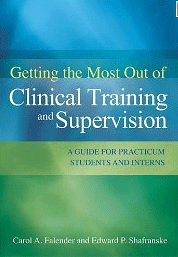“Getting the Most Out of Clinical Training and Supervision”

“Getting the Most Out of Clinical Training and Supervision:
A Guide for Practicum Students and Interns”
By Carol A. Falender and Edward P. Shafranske
American Psychological Association
Washington, D.C. 2012
‘Masterful’ resource fills training literature void
Reviewed by James K. Luiselli, Ed.D., ABPP, BCBA-D
Much has been written about conducting clinical supervision with psychology trainees. Indeed, as the authors of this book contend, “Supervision is the major means of transmission of the foundations of the psychology profession to students, trainees and supervisees in development.” And yet, there are few resources that address the needs and abilities of the people who receive supervision.
Carol F. Falender and Edward P. Shafranske are highly regarded psychologists who have advanced competency-based training and practices of clinical supervisors. In this book, they apply their competency model to supervisees. Some of the key elements they cover are the collaborative process of supervision, multiculturalism, achieving core skills, reflective practice and professional ethics. Admirably, the book fills a noticeable void in the psychology training literature.
Section I of the book is titled, “Becoming a Competent Supervisee.” In several chapters, the authors ask trainees to consider several questions as they begin their supervision: what are your goals, what learning strategies have been most effective for you and what competency benchmarks would you select from a detailed checklist contained in the book?
Other chapters present trainees with different theories of supervision to help them understand the common perspectives and expectations of most supervisors.
In Section II, “Developing Clinical Competence through Supervision,” the authors concentrate further on their competency-based training approach. One of the strongest chapters has to do with multicultural diversity, including a self-knowledge assessment. Trainees are then guided to think about conflicts that sometimes arise during supervision and how to resolve them. The critical area of case conceptualization is covered deftly as well. Finally, there is an instructive and illuminating chapter about ethics within and outside of supervision.
The third and final section of the book is called “Advancing Reflective Practice in Supervision.” Essentially, reflective practice urges trainees to carefully consider their role in supervision, the reciprocal dynamics of supervisory interactions, responding to unanticipated dilemmas with supervisors and becoming a practicing clinician. These chapters are supplemented nicely with an Appendix that has several reference documents.
As director of training for both predoctoral internship and postdoctoral fellowship programs in clinical psychology, I could not wait to get my hands on this book. I was not disappointed. Among its strengths is the authors’ perceptive and clearly described competency-based orientation that calls on trainees to acquire discrete skills in order to further their development in supervision. I call attention again to the exemplary competency benchmarks checklist that so concisely captures knowledge and performance domains for practicum students, interns and early-entry professionals.
Another positive feature of the book are the many useful exercises that Falender and Shafranske present as “reflective activities” intended to prepare trainees for supervisory experiences and support their development throughout. These activities are integrated within each chapter and aligned with the respective subject matter.
Quite simply, this book is one of the best of its kind, geared specifically to clinical psychology trainees who want to get the most from their formal supervision. Although the primary audience for the book is practicum students and interns, supervisors themselves should read it to improve their own skills.
In fact, the book is so good that I recommend it as a standard text for trainees and supervisors within psychology training programs. Truly, this is a masterful resource that explains and makes manifest the art and science of supervision.
James K. Luiselli, Ed.D., ABPP, BCBA-D, is senior vice president, applied research, clinical training and peer review at the May Institute in Norwood, Mass.
Learn more about the book: Getting the Most Out of Clinical Training and Supervision: A Guide to Practicum Students and Interns
